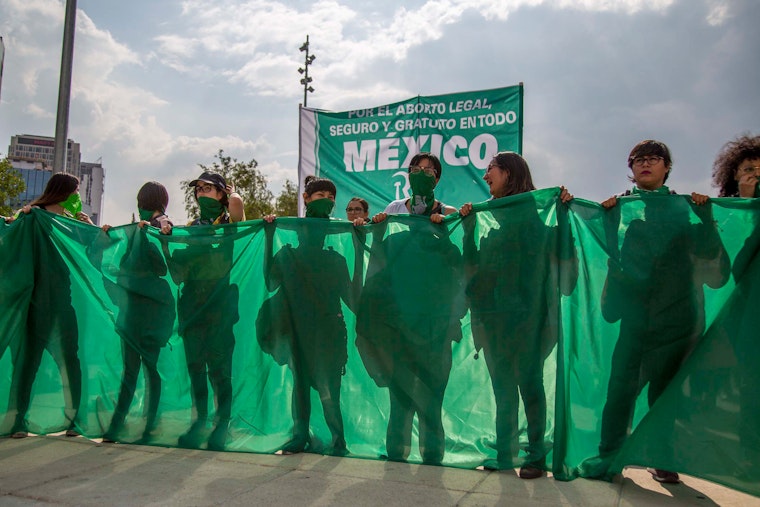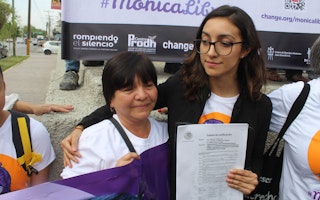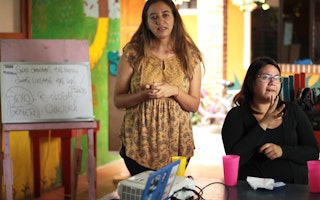Winning the Fight for Reproductive Rights in Mexico
By Rebeca Ramos

In the 1970s, Mexico’s feminist revolution launched millions of women into the workforce, prompting greater acceptance of family planning in our historically Catholic country. The fight for the right to choose an abortion would take decades longer. But on September 7, 2021, a few months before the United States Supreme Court turned the clock back on years of U.S. reproductive freedom by overturning Roe v. Wade, Mexico’s National Supreme Court of Justice unanimously declared unconstitutional the absolute criminalization of voluntary abortion—striking down provisions that had outlawed the practice in the northern state of Coahuila.
The landmark ruling recognized the right to terminate a pregnancy in public health institutions in an accessible, free, confidential, safe, expeditious, and non-discriminatory manner—opening the door to more sweeping reform across the country.
The Information Group for Chosen Reproduction, an Open Society Foundations grantee known by our Spanish initials as GIRE, has spent decades in communication and collaboration with reproductive rights groups across Mexico to push for such reforms. In early 2022, GIRE designed and launched a powerful national legal strategy to build on this change.
In partnership with local organizations, we filed lawsuits to decriminalize voluntary abortion in several Mexican states where it is still considered illegal—part of a campaign that included strategic communications, research, and advocacy efforts aimed at reinforcing the legal system’s mechanisms for defending the right to choose.
A key victory in our state-by-state fight came on August 30, 2023, when Mexico’s National Supreme Court ordered the Congress of the central state of Aguascalientes to decriminalize voluntary abortion. A week later, on September 6, the Court tossed out all federal criminal penalties for abortion. These stunning victories should spur further efforts to remove criminal penalties still on the books in 20 states.
They also serve as lessons learned for reproductive rights movements in other parts of the world, just as we took lessons from other parts of Latin America.
GIRE first took on the fight for reproductive rights in 1999, when the organization asked the Inter-American Commission on Human Rights to grant a 13-year-old girl rape victim the right to abortion because she became pregnant during the assault. While we didn’t win the case, the media attention it generated opened a massive public conversation about how hard it is to successfully prosecute a rape case, let alone one involving a pregnancy. In 2007, conversations like these prompted the Legislative Assembly of the Federal District’s decision to decriminalize abortion in the first 12 weeks of pregnancy.
Reproductive rights movements across the Americas have often been propelled by women involved in a broader human rights struggle. In Argentina, the reproductive rights movement of the last two decades took inspiration from the Mothers of the Plaza de Mayo’s monumental search for the disappeared and their children, who were lost through acts of systematic repression by the country’s military dictatorship in the late 1970s and early 1980s. Borrowing from the symbolism of these mothers marching in headscarves during protests, a new generation of human rights activists used green scarves to represent hope for reproductive freedom.
The #MeToo movement reignited a global conversation on gender and reproductive rights of all kinds, with many adopting green scarves to rally support. In 2020, Argentina’s National Congress passed a law decriminalizing abortion up to 14 weeks. Meanwhile in Colombia, the Causa Justa movement asked the public to consider why cases of rape, risk to the life of the pregnant person, and fetal malformation should be the only legal reasons for abortion. In 2022, this led the country’s Constitutional Court to expand on its 2006 law allowing abortion in such cases by decriminalizing the procedure up to 24 weeks of gestation.
That green wave helped propel our victories in Mexico. While work needs to be done to maximize the effects on Mexico as a whole, our campaign could not have achieved the historic feats it made last summer in the state of Aguascalientes or in the Congress of the Union without it.
In the case of Aguascalientes, this is the first time in Mexico’s movement that a legal proceeding initiated by civil society organizations has had such a far-reaching effect. It won’t just benefit our constituents; it will enhance the reproductive rights of all state residents with a capacity for pregnancy.
At the federal level, decriminalization significantly reaffirms the rights of pregnant people requesting abortion services at federal health institutions. In many of the cases GIRE worked on, these institutions denied patients abortions, alleging that health care professionals could be prosecuted for providing them. The Mexican Institute of Social Security and the State Worker Social Services are among the organizations that will now be required to provide abortion services to those who request it—a decision that could significantly impact 70 percent of the population served by these institutions.
Decisions like these inspire us to keep going with our legal strategy to ensure that all people in Mexico with a capacity for pregnancy can make their own reproductive decisions. To this end, we have initiated proceedings against the criminal codes of all states where abortion is still considered a crime, including Campeche, Chiapas, Chihuahua, Durango, State of Mexico, Guanajuato, Jalisco, Michoacán, Nayarit, Nuevo León, Puebla, Querétaro, San Luis Potosí, Tabasco, Tamaulipas, Tlaxcala, Yucatán, and Zacatecas. We are awaiting rulings in these respective jurisdictions. Given that many of these proceedings come as a response to the Supreme Court’s ruling, we trust that they will adhere to the local and federal rulings.
While we are committed to the decriminalization of abortion through judicial means, we also continue to fight for changes at the legislative level. Our goal is to completely remove voluntary abortion from the criminal codes, without restrictions to the stage or the cause of pregnancy, and to ensure that it is regulated as a health service, accessible to everyone.
Access to abortion, as a milestone in the fight for the right to decide, also requires that we work in the public and health services sectors with medical professionals, partners, and the media. We know that we still have a long way to go, but these recent victories inspire us to keep going.
The Information Group for Chosen Reproduction (GIRE) is a grantee of the Open Society Foundations.
Rebeca Ramos is executive director of the Information Group for Chosen Reproduction (GIRE).


